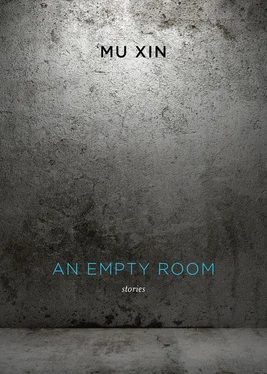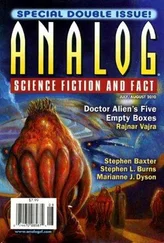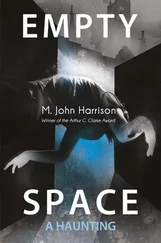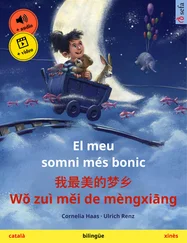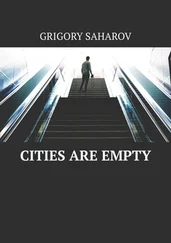Mu Xin - An Empty Room
Здесь есть возможность читать онлайн «Mu Xin - An Empty Room» весь текст электронной книги совершенно бесплатно (целиком полную версию без сокращений). В некоторых случаях можно слушать аудио, скачать через торрент в формате fb2 и присутствует краткое содержание. Год выпуска: 2011, Издательство: New Directions, Жанр: Современная проза, на английском языке. Описание произведения, (предисловие) а так же отзывы посетителей доступны на портале библиотеки ЛибКат.
- Название:An Empty Room
- Автор:
- Издательство:New Directions
- Жанр:
- Год:2011
- ISBN:нет данных
- Рейтинг книги:3 / 5. Голосов: 1
-
Избранное:Добавить в избранное
- Отзывы:
-
Ваша оценка:
- 60
- 1
- 2
- 3
- 4
- 5
An Empty Room: краткое содержание, описание и аннотация
Предлагаем к чтению аннотацию, описание, краткое содержание или предисловие (зависит от того, что написал сам автор книги «An Empty Room»). Если вы не нашли необходимую информацию о книге — напишите в комментариях, мы постараемся отыскать её.
In Our Time
An Empty Room
An Empty Room — читать онлайн бесплатно полную книгу (весь текст) целиком
Ниже представлен текст книги, разбитый по страницам. Система сохранения места последней прочитанной страницы, позволяет с удобством читать онлайн бесплатно книгу «An Empty Room», без необходимости каждый раз заново искать на чём Вы остановились. Поставьте закладку, и сможете в любой момент перейти на страницу, на которой закончили чтение.
Интервал:
Закладка:
Translator’s Afterword
More than twenty books by Mu Xin — an internationally renowned writer and painter — have been published in Taiwan and mainland China. The thirteen pieces of An Empty Room — his first collection of stories to appear in English — were specifically chosen by the author from three of his books:《散文一集》( Collected Sanwen: Volume 1 ; 1986), 《温莎墓园》( Windsor Cemetery ; 1988), and《巴珑》( Barron ; 1998).
Each story not only stands on its own as an individual work of fiction, but the collection as a whole can be read as a short story cycle, or a linked bildungsroman, written in varying first-person personae, each “I” embodying a different race, gender, history. This paradoxical coexistence of fragmentation and cohesiveness in one book is of course not an uncommon practice in modern literature, though it is essentially informed by Mu Xin’s own aesthetic principle, namely: the self, the artistically transformed and transforming self, must live through others so that others can live through him. The other referring not only to another person but also to an other time-space, an other reality, an other experience. Mu Xin’s style, which is influenced by both Chinese and world literature, and is simultaneously poetry, essay, and fiction, brings to light this relational other. It evokes the spirit of innovation in contemporary world literature and connects Mu Xin to the Chinese sanwen , a genre that freely crosses the boundaries of poetry, meditative essay, and fiction. Indeed, some of his texts were written in both prose and verse forms. In the Chinese tradition, Mu Xin admires the work of the eight great sanwen authors of the Tang and Song dynasties: Han Yu, Liu Zongyuan, Ouyang Xiu, Su Xun, Su Shi, Su Che, Wang Anshi, Zeng Gong. He also includes Nietzsche, Emerson, Rousseau, and Montaigne as some of his favorite authors that exemplify the sanwen spirit. In the best sense of the word, Mu Xin himself is a sanwen writer.
Mu Xin was born in 1927 in Wuzhen, Zhejiang Province. In his early years, he was exposed, through voluminous reading, to both the Chinese classical literati tradition and to Western artistic and cultural traditions. Part of this education was completed in the private library of Mao Dun, who was Mu Xin’s distant uncle and a major figure in modern Chinese literature. From 1949 till 1982, Mu Xin lived in China, and as an artist survived some terrifying experiences, including an eighteenth-month imprisonment in an abandoned air-raid shelter. Bizarre as it may sound to us today, Mu Xin’s case was commonplace in that time period. A person could be imprisoned without trial or sentencing and even without a legal court if he or she belonged to the “wrong” socal group (e.g., intellectuals) or showed “decadent” tendencies in thinking. Few works of Mu Xin’s literary and artistic creativity from that period have survived. From 1982 till 2006, Mu Xin lived in the United States. This was a period of prolific and profound artistic and literary creativity in his life. I met Mu Xin in New York in the late 1980s when his literary works began to arouse great interest among diasporic Chinese intellectuals. In the following decades, his writing and paintings won great admiration around the world and established him as a revered artist-intellectual. During those years, I twice interviewed him on his life and art and subsequently published those interviews. In 2006, the year when he returned to China to live in his hometown, his works, previously unpublished and largely unknown in mainland China, were re-issued and became such an event that the publishing world in China called 2006 “the Year of Mu Xin.”
I feel privileged that I’ve been able to work closely with Mu Xin to complete this translation. For the past decade or so I have continuously consulted him on issues relating to this book and have received direct advice from him about what details should be changed and what should not. Decisions in translation often concern details that initially seem trivial but are ultimately significant. In consultation with Mu Xin, for example, I decided to use “Fong Fong,” in the story “Fong Fong No. 4,” as the English transliteration instead of using the strictly Chinese pinyin rendition of “Fang Fang,” as the latter might cause confusing connotations in English. During the various stages of working on this collection, many other such choices were made, not to deviate from the original, but to try to capture the spirit of Mu Xin’s stylized, elegant Chinese.
Over the years, Arthur F. Kinney, Donald Junkins, John Parker, Vilma Potter, Susan Harris, Ruben Quintero, Roberto Cantu, Timothy Steele, Chen Danqing, and Hugo Liu read parts of the manuscript in English and generously offered suggestions and comments. I am grateful to the literary agent Joanne Wang for making the publication of this book possible. Last but not least, Jeffrey Yang from New Directions gave the entire collection a patient and thorough editing that graces my translation. I wish to acknowledge my heartfelt thanks to all of them.
TOMING JUN LIU
JANUARY 1, 2011
About the Author
MU XIN, born in 1927 in the south of China, is the author of twenty collections of stories, poetry, and essays. He is also an internationally renowned painter. During the Cultural Revolution much of his work — manuscripts and paintings — was destroyed. He moved to the United States in 1982, living in Queens, New York, until 2006. He now lives in his hometown, Wuzhen, in Zhejiang Province. The thirteen stories in this collection were composed while Mu Xin lived in New York.
TOMING JUN LIU grew up in China and received his education in China, Britain, and the United States. He was a translator at the United Nations Secretariat in the early 1980s. He is now Professor of English at California State University, Los Angeles, and holds an endowed professorship at Hangzhou Normal University, China.
Интервал:
Закладка:
Похожие книги на «An Empty Room»
Представляем Вашему вниманию похожие книги на «An Empty Room» списком для выбора. Мы отобрали схожую по названию и смыслу литературу в надежде предоставить читателям больше вариантов отыскать новые, интересные, ещё непрочитанные произведения.
Обсуждение, отзывы о книге «An Empty Room» и просто собственные мнения читателей. Оставьте ваши комментарии, напишите, что Вы думаете о произведении, его смысле или главных героях. Укажите что конкретно понравилось, а что нет, и почему Вы так считаете.
